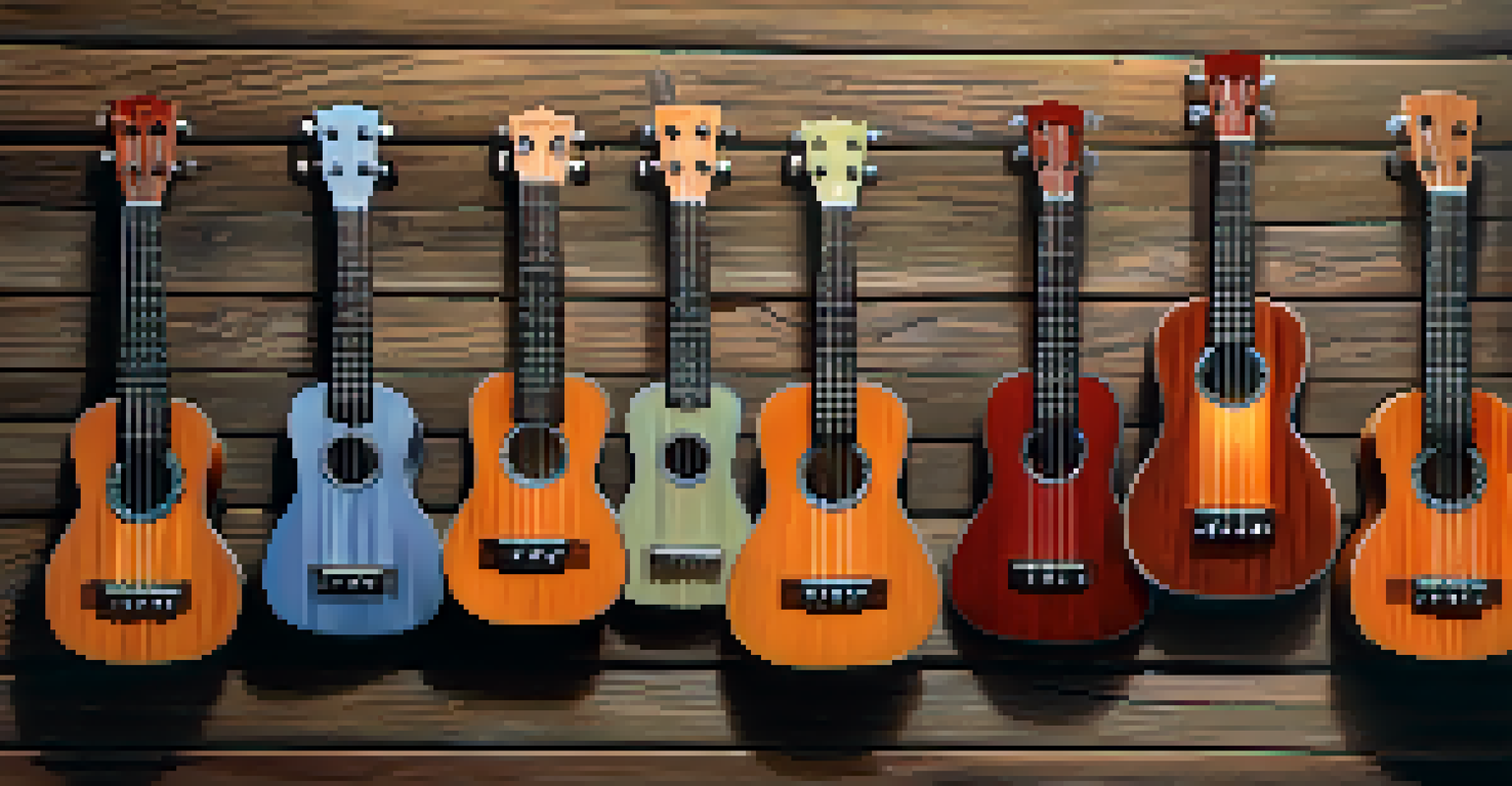Selecting the Right Strings for Your Handmade Ukulele

Understanding the Different Ukulele String Types
When it comes to ukulele strings, there are several types to consider, including nylon, fluorocarbon, and gut. Each type has its own unique sound and feel, influencing how your ukulele will resonate. Nylon strings are popular for their warm tones, while fluorocarbon offers a brighter sound. Knowing the differences can help you choose the right strings for your musical style.
Music is the shorthand of emotion.
Nylon strings are usually the go-to choice for beginners, as they are soft on the fingers and produce a mellow tone. On the other hand, fluorocarbon strings are known for their clarity and projection, making them ideal for more experienced players looking to enhance their sound. If you're striving for a vintage feel, gut strings might be worth exploring, although they require more maintenance.
Ultimately, the choice of string type will depend on your personal preference and the kind of music you want to play. Take some time to experiment with different materials to find the perfect match for your handmade ukulele.
Choosing the Right String Gauge for Comfort and Sound
String gauge refers to the thickness of the strings, and it plays a significant role in both playability and tone. Thicker strings (high gauge) produce a louder sound but can be tougher on the fingers, especially for beginners. Conversely, thinner strings (low gauge) are easier to press down, making them a great choice for those still building their finger strength.

If you’re just starting out, you might find that a lighter gauge offers a more comfortable playing experience. As you progress, you may want to experiment with heavier strings to see how they affect your sound. Just remember, changing the gauge can also alter your ukulele’s setup, so it's best to do a little research before making the switch.
Choose Ukulele Strings Wisely
Considering the type and material of ukulele strings can significantly enhance your sound and playing experience.
In the end, your choice of string gauge should align with your skill level and the tone you wish to achieve. Don’t hesitate to ask fellow musicians or your local music shop for recommendations based on your specific needs.
Exploring Different String Materials and Their Sounds
Each material used for ukulele strings brings its own characteristics to the instrument's sound. For example, nylon strings often produce a soft, mellow tone, while fluorocarbon strings deliver a brighter, more focused sound. Understanding these subtle differences can help you tailor your string choice to your artistic vision.
The beautiful thing about learning is that no one can take it away from you.
Besides nylon and fluorocarbon, you can also find strings made from materials like wound metal or synthetic compounds. These options can provide unique tonal qualities that might be just what you're looking for as you explore various musical genres. Experimenting with different materials can be an exciting part of your ukulele journey.
Ultimately, the material you choose should resonate with your playing style. Consider trying out a few different types to see which one feels and sounds best to you—after all, music is about personal expression!
The Importance of String Tension in Your Sound
String tension refers to how tightly the strings are held on the ukulele. It significantly affects both the instrument's playability and sound. Higher tension strings can produce a brighter tone with more volume, while lower tension strings typically offer a softer sound and make it easier to fret notes.
When selecting your strings, consider how much tension you prefer. If you enjoy fingerpicking or strumming softly, you might lean toward lower tension options. However, if you're aiming for a more powerful sound, higher tension strings could be the way to go.
Gauge Affects Playability
The string gauge you choose impacts both the comfort of playing and the tone produced by your ukulele.
Finding that perfect balance of tension is key to enhancing your playing experience. Pay attention to how your ukulele responds to different tensions, and adjust your choice accordingly for the best results.
Considering Your Playing Style When Choosing Strings
Your playing style is a significant factor in determining the best strings for your handmade ukulele. If you primarily strum chords, you might prefer a set of strings that provides a full-bodied sound. Conversely, if fingerpicking is your forte, you may want to prioritize clarity and responsiveness in your string choice.
For those who dabble in various styles, a versatile option like medium-gauge nylon strings could be a great compromise. They offer a balance between comfort and sound quality, making them suitable for both strumming and picking. As you grow as a musician, your playing style may evolve, and so might your string preferences.
Ultimately, the key is to find strings that complement your unique approach to playing. Take the time to assess your style and choose strings that inspire you to create beautiful music.
Testing Out Strings: A Hands-On Approach
The best way to find the right strings for your ukulele is to try them out firsthand. Many music shops offer a variety of string samples, allowing you to test the sound and feel before committing to a full set. This hands-on experience can be invaluable, especially for those new to the instrument.
As you test different strings, pay attention to how they respond to your playing style. Are they comfortable to fret? Do they produce the tone you’re looking for? Taking notes during your trials can help you make an informed decision later on.
Experiment for the Best Fit
Testing different strings hands-on is crucial for finding the perfect match for your unique playing style.
Remember, what works for one player may not work for another, so trust your instincts. Your handmade ukulele is a reflection of your artistry, and the right strings can enhance that expression.
Maintaining Your Strings for Longevity and Sound Quality
Once you've selected the perfect strings for your ukulele, it's important to maintain them for optimal performance. Regular cleaning can prevent grime and sweat buildup, which can dull the sound and shorten the lifespan of your strings. A simple wipe down with a soft cloth after playing can make a significant difference.
Additionally, consider the environment where you store your ukulele. Humidity and temperature fluctuations can affect string condition, so keeping your instrument in a stable environment is crucial. If you live in an area with high humidity, investing in a dehumidifier can help protect your strings.

By treating your strings with care, you'll not only enhance their longevity but also ensure that your ukulele continues to sound its best. A little maintenance goes a long way in preserving the beautiful music you create.